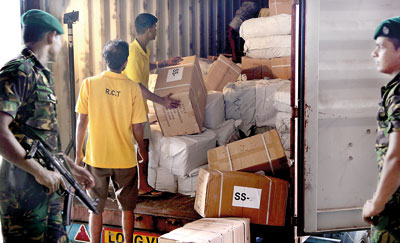News
Swindling of state revenue: Customs raids curbed
Customs officers have been curtailed from carrying out lightning raids on those swindling state revenue. Customs Director General Jagath P. Wijeweera has said in a Department Order that “whenever a necessity arises to conduct a raid, a written submission must be made elaborating the need.” He has said that a “Writ of Assistance” must be obtained from the respective director in charge.
The move has angered Customs officers. A senior officer who spoke on grounds of anonymity said the directive “violated the simple element of secrecy which is the key factor to a successful raid.” The source added, “Whilst the powerful among business interests will get to know about raids well in advance, officers who seek such permission will become targets.”
Mr. Wijeweera has claimed that “numerous complaints have been received from importers, exporters, shipping lines and other stakeholders, regarding the delays in conducting Customs investigations and inquiries.” He has claimed that “procedural lapses have been revealed during court cases and added that in several instances there has been “abuse of power” by Customs officers.

In view of threats from smugglers, Customs officers had to seek help from the Police Special Task Force (STF) yesterday to check a container containing illegally imported items. Pic by M. A. Pushpakumara
The Customs Chief has warned that non-compliance with his new orders will make Customs officers liable for disciplinary action under the Establishment Code. He has said that the Attorney General has given guidelines with regard to arrest, detention and producing suspects before a magistrate.
Here are other highlights of the new order sent out by the Customs Chief:
- A customs officer could arrest a person only on reasonable suspicion that an offence under the Customs Ordinance has been committed. The reasonable suspicion must be objective and should not be uncertain and of vague nature.
- If an arrest is made on information received, it is the duty of the officer of Customs to verify the credibility of such information prior to making the arrest.
- Officers must be mindful of infringement of fundamental rights of a citizen when a person is arrested and detained. Only when the bona fide and justifiable reasons prevail, such action must be resorted to.
- A Case file belongs to the Department. A case file should be always securely kept in the office. A respective director should have access to the case file at any given time. When it is necessary to take the file away from office for the purpose of investigations or to attend courts, necessary log entries should be made to this effect. Officers cannot take the case files home without written authority from the respective director.
- Disputes on Commodity Clarification must be first settled before starting a formal Customs Inquiry. An Inquiring Officer should not be saddled with the burden of declining classification issues at the Customs Inquiry.
- The classification issues should be first referred to the Commodity Classifications Unit which functions under the Director (Specialised Services) for a ruling. If the parties in dispute are not satisfied with the ruling given by the Commodity Classifications Unit, such matter should be referred to the NC Committee for a ruling. · The ruling of the NC Committee on Commodity Classification is final and binding on all officers. However, in exceptional circumstances and on valid grounds, an appeal may be made to DGC for further review.
- No individual officer, a Division or a Directorate should make determination on classification disputes, only the Commodity Classifications Unit and the NC Committee are empowered to give ruling on classification disputes.
- In case of commercial importation or exportation, the disputes on valuation should be referred to the Valuation Directorate for determination on values.
- Officers who maintain individual records of values may forwards such records to the Valuation Directorate to facilitate determining correct value. If the parties in dispute are not satisfied with the value determined by the Valuation Directorate, they could appeal to the Valuation Committee and then to the DGC on justifiable grounds.
- n Issues relating to distribution and payment of rewards, and disputes on deciding the initiation etc. should be decided by the Department. This Department is to appoint an “Appellate Body” consisting of Additional Director General and Senior officials to look into officers’ grievances. This arrangement will not take away the Officers’ right to seek legal remedy in a Court of Law.
However, in such circumstances, approval of the Secretary to the Ministry of Finance is required as per Clause No. 7:1 of Chapter XXXIII of the Establishment Code, Volume I.
Follow @timesonlinelk
comments powered by Disqus

